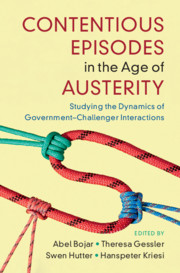 Contentious Episodes in the Age of Austerity
Contentious Episodes in the Age of Austerity Book contents
- Contentious Episodes in the Age of Austerity
- Cambridge Studies in Contentious Politics
- Contentious Episodes in the Age of Austerity
- Copyright page
- Contents
- Figures
- Tables
- Contributors
- Preface
- Part I A New Approach to the Analysis of Contentious Episodes
- Part II Varieties of Contention
- Part III Dynamics of Interaction
- Part IV Conclusion
- 13 Conclusion
- Appendices
- References
- Index
- Series page
13 - Conclusion
from Part IV - Conclusion
Published online by Cambridge University Press: 05 November 2021
- Contentious Episodes in the Age of Austerity
- Cambridge Studies in Contentious Politics
- Contentious Episodes in the Age of Austerity
- Copyright page
- Contents
- Figures
- Tables
- Contributors
- Preface
- Part I A New Approach to the Analysis of Contentious Episodes
- Part II Varieties of Contention
- Part III Dynamics of Interaction
- Part IV Conclusion
- 13 Conclusion
- Appendices
- References
- Index
- Series page
Summary
At the outset of this volume, we situated our approach between two main paradigms prevailing in the field of contentious politics, taking up the challenge that Tilly (2008) put forward more than a decade ago. One, epitomized by the “narrative” approach, focuses on conventional storytelling, where explanation takes the form of an unfolding open-ended story. The other, protest event analysis (PEA) (see Hutter, 2014 and Koopmans and Rucht, 2002 for reviews), or what we called the epidemiological approach, focuses on a narrower set of action types: namely, instances of popular mobilization in the streets, and primarily relies on statistical techniques to explain the temporal regularities of protest actions or protest waves (Lorenzini et al, 2020). We aimed to accomplish this task by drawing on the programmatic Dynamics of Contention (McAdam et al. 2001) with an eye on preserving the conceptual depth of the former infused with the methodological rigor of the latter. In addressing “the middle ground” favored by Charles Tilly, we applied an analytical approach to the study of the dynamics of contention that allows for the systematic comparative analysis of causal patterns across individual narratives.
- Type
- Chapter
- Information
- Contentious Episodes in the Age of AusterityStudying the Dynamics of Government–Challenger Interactions, pp. 255 - 270Publisher: Cambridge University PressPrint publication year: 2021
